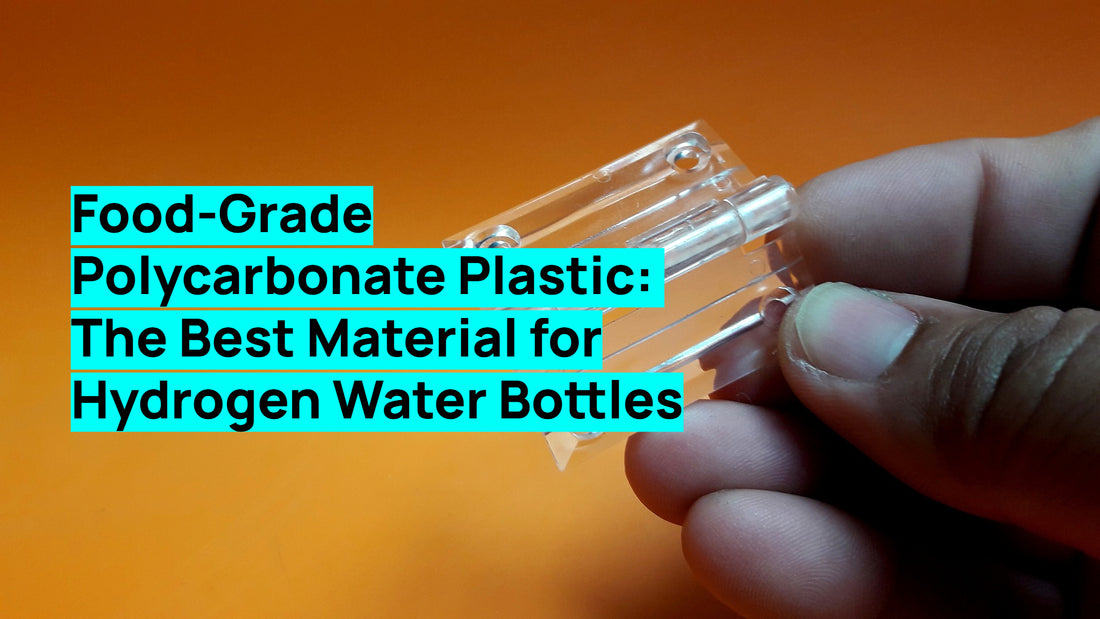
Food-Grade Polycarbonate Plastic: The Best Material for Hydrogen Water Bottles
Share
Food-grade polycarbonate is a widely used material in hydrogen water bottles due to its unique combination of strength, safety, and functionality. Its ability to withstand high pressures and maintain water purity makes it ideal for producing high concentrations of hydrogen. This article explores the key benefits, safety standards, and why food-grade polycarbonate stands out as the preferred choice for hydrogen water bottles.
Key Takeaways
- Food-grade polycarbonate plastic is a strong, durable, and safe material for hydrogen water bottles.
- It can withstand pressures up to 160 PSI, making it ideal for generating high hydrogen concentrations.
- Polycarbonate meets strict food safety standards, ensuring water purity.
- Unlike glass, polycarbonate resists cracking and is lightweight, perfect for daily use.
- Its transparency enhances the user experience by showcasing hydrogen bubbles during electrolysis.
- Polycarbonate is recyclable, offering a sustainable option when used long-term.
What Is Food-Grade Polycarbonate Plastic?
Food-grade polycarbonate is a lightweight, transparent plastic known for its strength, safety, and durability. Specifically designed for use in food and beverage applications, it meets stringent safety standards to ensure no harmful chemicals leach into the water. As one of the most versatile hydrogen water bottle materials, polycarbonate offers the perfect balance of pressure resistance and clarity, making it an ideal choice for bottles that generate high concentrations of hydrogen. Its ability to withstand high pressures, combined with its lightweight nature, ensures both reliability and portability for daily use.

Why Is Polycarbonate Plastic Ideal for Hydrogen Water Bottles?
Polycarbonate is the material of choice for hydrogen water bottles for several reasons:
- Pressure Resistance: Able to withstand pressures up to 160 PSI, food-grade polycarbonate is perfect for generating high concentrations of hydrogen, a process that requires durable materials.
- Safety and Compliance: Tested to meet EU and LFGB food safety standards, polycarbonate ensures no harmful chemicals, such as BPA, migrate into the water.
- Transparency: Its clear finish enhances the user experience by allowing users to see hydrogen bubbles forming during the electrolysis process.
- Lightweight Durability: Stronger than glass but much lighter, polycarbonate ensures portability and reliability in daily use.
How Food-Grade Polycarbonate Plastic Enhances Safety
Safety is paramount in hydrogen water bottles, and food-grade polycarbonate delivers in several ways:
- Chemical Stability: Polycarbonate does not leach harmful substances into the water, even under high pressure or when exposed to warm liquids.
- Migration Testing: Independent tests confirm that polycarbonate complies with international standards for food contact materials, ensuring water purity.
- Impact Resistance: Unlike glass, polycarbonate resists cracking and breaking, reducing the risk of contamination from shattered material.

Polycarbonate vs. Glass for Hydrogen Water Bottles
While glass is often considered a premium material, it falls short in key areas when compared to food-grade polycarbonate for hydrogen water bottles:
- Pressure Handling: Glass hydrogen water bottles cannot withstand the high pressures needed to infuse water with therapeutic levels of hydrogen, making polycarbonate the safer choice.
- Durability: Polycarbonate is far more resistant to impact, ensuring longer product life.
- Portability: Lightweight polycarbonate is more practical for users on the go compared to heavier glass bottles.
Environmental Considerations for Polycarbonate Plastic Hydrogen Water Bottles
While food-grade polycarbonate is not as inherently eco-friendly as materials like glass, its durability and reusability make it a sustainable option for long-term use. By opting for a polycarbonate hydrogen water bottle, users can significantly reduce their reliance on single-use plastics, contributing to environmental conservation. Additionally, polycarbonate is recyclable, meaning that with proper disposal, it can be repurposed into new products, minimising waste.
For those exploring the environmental impact of hydrogen water bottle materials, polycarbonate strikes a balance between performance and sustainability when used responsibly.
Conclusion: The Advantages of Food-Grade Polycarbonate Plastic Hydrogen Water Bottles
Food-grade polycarbonate is the optimal material for hydrogen water bottles due to its strength, safety, and suitability for high-pressure applications. Its ability to maintain water purity, withstand rigorous use, and deliver a superior user experience makes it the go-to choice for hydrogen water bottle manufacturers. When choosing a hydrogen water bottle, understanding the importance of materials like polycarbonate ensures you select a product that is reliable, safe, and built to last.
